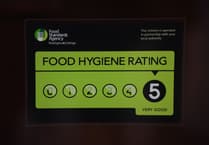BUDGET hotel giant Travelodge has publicly announced that it wants to open a hotel in Bude as part of its £165-million seaside and coastal town expansion programme.
The announcement comes despite the hotel chain having yet to confirm where it would be built.
It would be Travelodge’s first hotel in Bude and it would represent a local investment of £5.5-million by third party investors and create 25 new jobs within the community.
Travelodge is yet to confirm that it has acquired a site within the town.
A spokesperson told the Post: “All we can say at this time is that we are really keen on building a site in Bude. We don’t have an agreed site yet, but we are working with the local council to find one. We sent out a letter today [Monday] to Bude-Stratton Town Council.
“All we can say for the moment is that we are really keen to move into Bude. The sooner the better really.”
Many have speculated that Travelodge would be moving into the recently demolished plot of land, where the old Hookways bus depot once stood.
A planning application was submitted in March, from ERX Development Limited, seeking full planning permission and conservation area consent for the development of a 70-bed budget hotel, including bar and café, with associated car park and access works.
Within one of the application documents, it stated, ‘This development is herein referred to as ‘Bude Travelodge’ due to the anticipated occupier being Travelodge’ — despite the budget chain not confirming it themselves.
The application was brought to Bude-Stratton Town Council’s (BSTC) planning committee meeting on April 11 where they raised objection to the proposal. The planning application is still active and awaits a decision from Cornwall Council.
Bude is one of seven coastal locations that Travelodge wants to open a new hotel in across Cornwall — other locations are Truro, St Ives, Penzance, Fowey, Newquay and Falmouth.
According to the hotel chain, Travelodge selected Bude as one of its key Cornish target locations as its popularity with holidaymakers dates back to Victorian times. The hotel giant also recognised Bude as ‘being the gateway to Cornwall and Devon’ and that ‘the town is famous for its Summerleaze and Crooklets beach — attracting visitors from all corners of the UK’.
This coastal expansion programme of 26 hotels collectively would represent a potential investment of £165-million for third party investors and create around 650 new jobs.
Tony O’ Brien, Travelodge UK development director, said: “To kick start our Cornish expansion programme, we are writing to Bude-Stratton Town Council to see if we can play a pivotal role in their regeneration programme like we have done in Rhyl. Investing in a low-cost hotel like Travelodge is an increasingly attractive choice, as it draws visitors, creates jobs and helps boost the local economy.”
Bude’s mayor Cllr Bob Willingham told the Post that the hotel giant had already acquired the old Hookways bus depot and submitted planning applications.
He said: “We have been shown another plan but it still wasn’t acceptable. The Travelodge have the old Hookways and cinema site. They have put one application in but it was too large and we are waiting for a second application.”
Travelodge were unable to comment further on the matter.
Ian Mason, Bude Chamber of Commerce secretary, said: “Bude Chamber of Commerce is pleased that Bude’s popularity as a tourist destination continues to grow. The proposal from Travelodge to establish a hotel in the town is another reflection of that. As a coastal community town that is hugely dependent on tourism for its economy, Bude is ready to welcome additional visitors. With its popular beaches and environment credentials, it isn’t hard to see why families and young people wish to visit Bude. However, the Chamber does have concerns about the impact that large hotel chains could have on the local independent hotels and B&Bs, which provide good friendly personal service and are part of Bude’s traditional offering. It is essential to preserve and develop Bude’s character as a quality all-year round destination, which is based on a strong community identity, care for the environment and a vibrant town-centre scene.”




Comments
This article has no comments yet. Be the first to leave a comment.